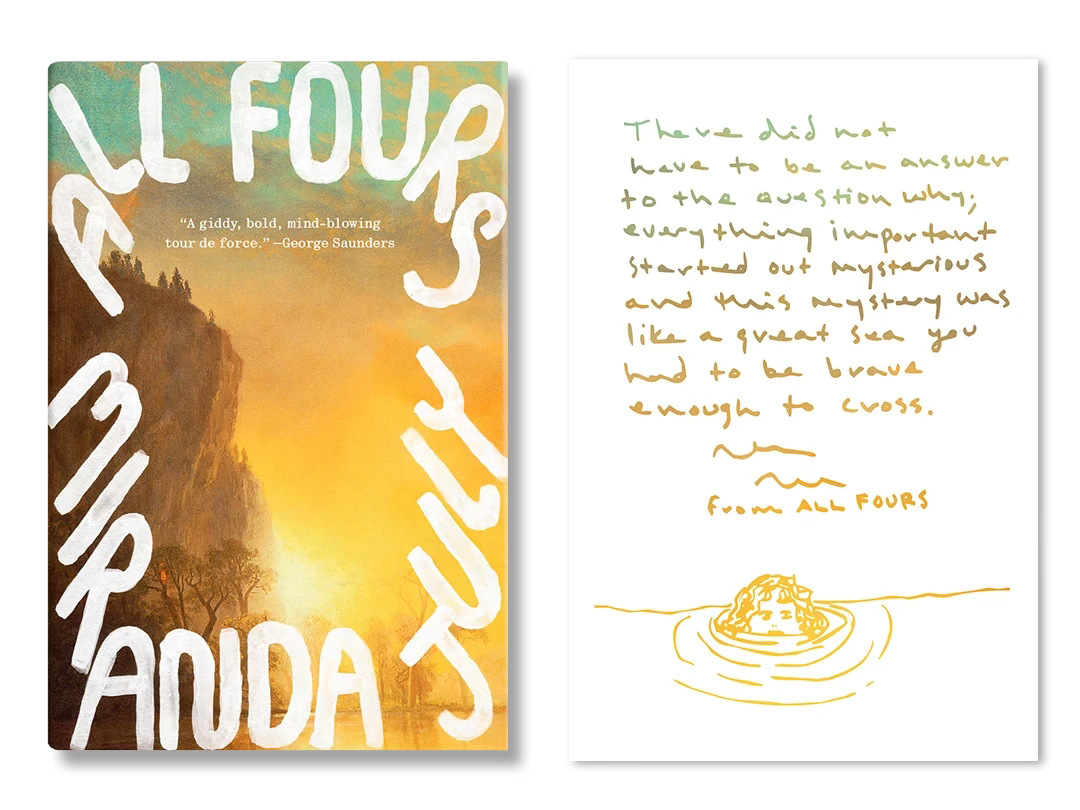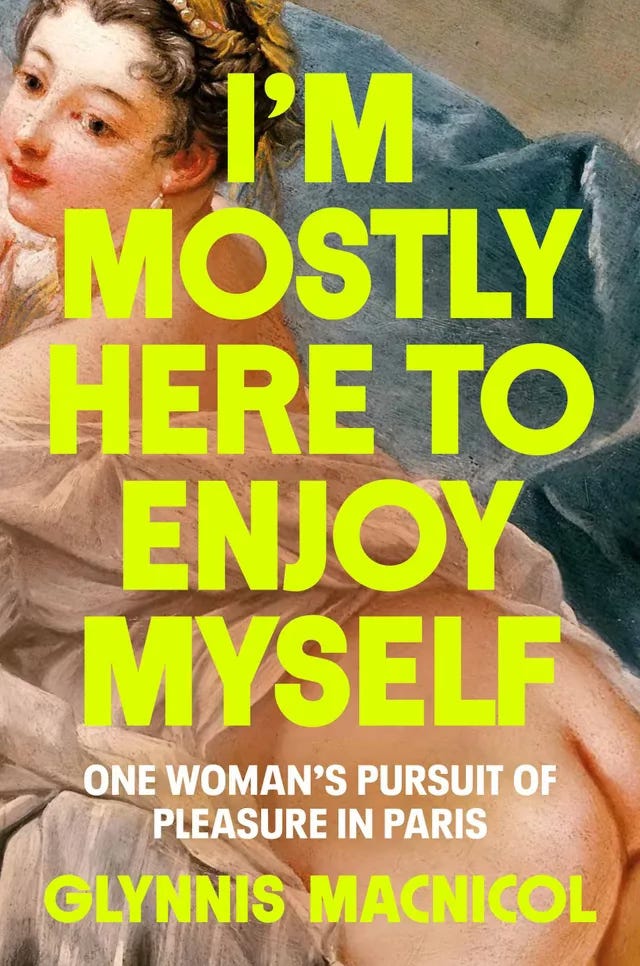“Instead of my prospects diminishing, as nearly every message that gets sent my way promises they will—fewer relationships, less excitement, less sex, less visibility—I find them widening. The world is more available to me than it’s ever been,” Glynnis MacNicol
Middle-aged women are on fire this summer, and I don’t mean the vasomotor symptoms caused by a decline in estrogen. Older women are seemingly everywhere, publicly and proudly imagining a vibrant second half of their lives, unabashedly pursuing their desires and, yes, even having hot sex. From Cosmo’s new feature “Sex After 60,” to movies like “The Idea of You” about finding fulfillment in midlife, to recent bestselling books that give women permission to burn down what no longer serves them and turn up the heat in their lives.
My own “hot menopausal women summer” started with an invitation to come to Palo Alto to moderate a Happy Woman Dinner, events in cities across the country that promote women authors and their new books. This particular night was meant to celebrate Lyz Lenz (
) and her new book, “This American Ex-Wife: How I Ended My Marriage and Started My Life.” After enjoying dinner on an outside patio, about 30 women—most of them over age 50—gathered in the living room to discuss Lenz’s book. Lenz told the crowd she knew she needed to leave her marriage when her now ex-husband suggested they have a third child, and she was forced to choose between being a successful writer or being married. She chose herself. As Lenz writes in her book, “It wasn’t violent abuse. It wasn’t another woman. It was trash on the floor, sticky counters, and please please please clean the bathroom, over and over, until I couldn’t do it anymore. And maybe I could have. Maybe I could have just given up and been miserable for a few years until our children were older. But I didn’t want to. I didn’t want to waste my one wild and precious life telling a grown man where to find the ketchup in the fridge.”The women in the audience nodded in agreement, and several of them chimed in about their own experiences with being married, divorced, or dating as a woman in midlife. Some of the women said they were unhappily married and wanted out. Others said their divorces had given them new freedom after being confined to one partner for so many years. But interestingly, none of the women said they were happily married, but maybe that’s why they came to the Happy Woman Dinner about divorce in the first place.
As a panelist, I told my own story about getting married at age 23, having three children before I was 30, and then deciding to divorce in my mid-thirties. Not because my husband was a monster—he hadn’t done anything wrong—but because I simply no longer wanted to be married to him. So often, women are told they have to have a reason for divorcing: their partner was unfaithful or abusive or an addict. But as I got closer to turning 40, I realized I had married the wrong person, and I didn’t want to spend the second half of my life settling for a partnership I chose in my early twenties. After the panel, a woman in the audience approached me and said, “I’m so glad you said your ex-husband was nice. My husband is nice, too—I just don’t want to be married to him anymore. Thank you for giving me permission to want something different just because I do.”
What became clear to me during that conversation was that—unlike any generation before us—Gen X women have the opportunity and ability to live two lives. During the first half of our lives, we were so focused on building the scaffolding we were told we needed to have the careers, partnerships, and children (that we were also told we needed). We agreed to all of the obligations and became beholden to expectations. But now, at the beginning of the second half of our lives, we are realizing we have another half of a lifetime to burn all that scaffolding down and create new lives based on our own wants and needs. And thanks to modern-day life expectancy rates, we not only have the perspective and the wisdom to see that we can start over again, but we have the time to do it. Unlike our mothers’ and grandmothers’ generations, menopause doesn’t have to be the end of our lives—it can be the beginning of a brand-new one.
This idea is amplified by the summer’s hit book, “All Fours,” by Miranda July, which is being hailed as the first great perimenopausal novel. The book’s 45-year-old narrator (who isn’t given a name so readers can identify with or as her) is reevaluating her career, her marriage, and her identity, and eventually turns to dance, sex, and friendship to help her determine what she truly wants. The book is about art and creating, marriage dynamics and gender roles, but, ultimately, it’s about how women can confront their hidden desires—something so many women in midlife have been afraid to admit they have. In one scene in the book, the narrator and a friend attempt to decipher a chart depicting the dramatic drop in women’s estrogen levels that starts at around age 45. “We’re about to fall off a cliff. We’re going to be totally different people in a few years,” the narrator says.
In the end, that ticking clock leads the narrator to realize what she truly desires is freedom—freedom from the binary choices society gave her when she was young and freedom from being forced to give up what she wants to fulfill her partner’s expectations.
July said she hopes her book will encourage other women to imagine and discuss both what we’ve given up and what’s still possible in midlife, saying, “I feel like the conversation can now happen aloud, you know? Like, not whispered. That’s my big dream—that that shift happens.”
Glynnis MacNicol’s new memoir, “I’m Mostly Here to Enjoy Myself: One Woman’s Pursuit of Pleasure in Paris,” is further evidence that this shift is happening. MacNicol writes about her decision at age 47 to spend a year in Paris post-pandemic and embark on a series of one-off sexual encounters purely for the purpose of pleasure. And the more encounters she has, the more she realizes that she’s not just starved for companionship but “consumed with the desire for touch.”
MacNicol’s exploration is both psychological and physical, and along the way, she becomes aware of her pre-Paris detachment from her desires and starts to ponder the stigma for women over age 40 that prevents them from seeking their own pleasure—sexual and otherwise. “It’s not just in enjoying my age that I’m defying expectations. It’s that I’ve exempted myself from the central things we’re told give a woman’s life meaning: partnership and parenting. I’ve discovered that despite all the warnings, I regret none of those choices,” writes MacNicol, who is not married and doesn’t have children.
This is the point of our one wild and precious life: to live it so that we don’t have regrets at the end. The most common deathbed regret among the dying? According to palliative care experts, it’s that they didn’t live a life that was true to them. For Gen X women, avoiding that fate starts with acknowledging that our twenties aren’t the only acceptable age to grow and evolve. To trust that even later in life, we can find a trap door in the scaffolding that society told us to build. To believe we can stop suppressing the exhilaration of being alive and wanting to find aliveness. To admit that we have desires and then actually pursue them. To have joy—to be free and dance and have good sex—just because we want to. To believe the world is more available to us than it’s ever been. And to be willing to burn it all down and start all over again.
My upcoming book, Fired Up: How to Turn Your Spark Into a Flame and Come Alive at Any Age, is now available for preorder! This book is my guide to figuring out what lights you up and will show you how to live on fire every day. Click here to preorder and get locked into some incredible bonuses.









My daughter misheard “menopause body” as “middle hot body” and that’s what it will be known as forever more. 🔥🔥🔥
And it keeps going. I'm 71 and yes, physical shit is happening, but my life continues to get better and I continue to feel freer and happier than ever. I can't wait to see what's next!